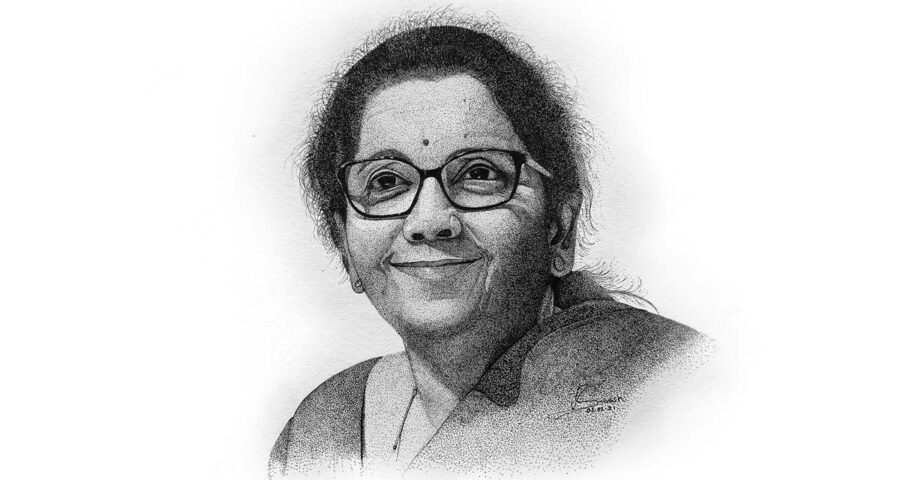Finance Minister Nirmala Sitharaman said that deductions and exemptions under the personal income-tax regime will be gradually removed but when they are, the government will set attractive rates to make taxation more simple.
Other than health on which higher spending was expected, one of the other expectations was that on the slightly negative side, everyone expected a Covid tax, a Covid cess, a new tax on the super-rich or a wealth tax. You have steered clear of all of this, how difficult was it to one, resist the temptation of a tax and two, how well can you address the challenge of revenue generation?
At least for this year we have clearly shown, this year meaning, year ending March 31, we have already shown our intent about how to improve the GST collection. We have not done anything other than usual. Only we made a conscious attempt by using artificial intelligence and big data to plug the loopholes and as a result you see the compliance is improving, the false and fake bills, which were being used for refunds have all stopped and even more people see the point in complying rather than any bad temptation among few people to evade. So that is on the one side. On the other, I have also made it very plain that this investment, asset monetisation, are both going to take top priority. Asset monetisation from utilising all those ideal assets, which are lying, which cannot really help the economy are going to have to be monetised. So we are pushing on asset monetisation on the one hand and on the other, looking at better revenue collection. With these two, we think we’ll realistically achieve the targets we have given ourselves. But on the tax rise, I have been very clear from the beginning, meaning, even when the AtmaNirbhar announcements were being made and also, when many other country examples were quoted to me, I would quote back an example of a country and I am not taking the name here of a country which spent more than 15 per cent of its GST for giving stimulus, but came at the end of it in December to say they may look at a comprehensive tax increase across the board. That is the point at which I have started saying that we have not even thought (along) those lines and today we are showing that that has not been on the board ever.
Just one quick follow-up on the tax thing because one of the things you have done is the Agriculture Infrastructure and Development Cess, the AIDC, which has created a stir of thoughts. Can you tell us more?
I will start with an example. Assume there is an item or a commodity in which we had put a 12 per cent basic customs duty, what I’ve done is to bring down the customs duty, say to 7 per cent. And on that I have added, let us say, for example, a three percent, this AIDC, which eventually means the customer, or the consumer or the importer is going to pay 10 per cent only and not 12.5. To him, it’s a reduction in the overall BCD that he paid. Although he is now paying a BCD and the AIDC. I have only made sure that the duty is brought down substantially, from which I get also by adding the cess, a certain amount dedicated for agricultural infrastructure and this, end of the day, if anything, should retain the price, if not bring it down, but it cannot increase the ultimate burden on the importer. That was clear formulation with which we’ve gone through and therefore there is nothing in this, which will burden the person who is importing and paying the basic customs duty. Similar with petrol and diesel also, people have already started talking I am told that oh my God they have put the cess on this also, not at all, there is a component in the additional surcharge, which the Government of India, additional excise duty which the Government of India imposes, which is purely for central government, it does not become a part of the devolution. On that, we’ve brought the cess down, extra excise duty down and added the cess to it. It is not going to increase the fuel price on this core at all. If it gets increased because of the oil companies, I don’t know that because that is purely a market-based operation with the oil market companies. But my cost is on the additional excise duty, which is a purely central government business.
You spoke about asset monetisation, I couldn’t find a target for it in the documents, you’ve not taken a target for it this year?
No, I’ve only said through disinvestment a total Rs 1.75 lakh crore is what we are expecting. It might be difficult, post immediately after corona, for me to put a number there because I really don’t know now, what the enterprise value is, what the market is going to look at it as its stressed asset value, how are these PSEs, after the corona, so it might be very difficult for me to commit a number and not be able to….
One of the assumptions that you have made is 14.4 per cent nominal growth rate because the economic survey assumes a 15.4 per cent nominal growth rate. What is the divergence cost like? Have you assumed a more moderate inflation regime or do you expect a slightly lower growth?
No, it’s like I suppose people who deal with money in banks, have an approach to taking a call, a decision, they were rather conservative and that’s how they should me. Whereas you and me, probably sitting outside and probably be a bit more flamboyant about it. So I would put the CEA’s report, being an academic, free-thinker he can be a bit more flamboyant. Whereas we in the Ministry of Finance, naturally and rightly will have to be reasonable in assessing what we can do.
I have also heard the 15 per cent number also given by some people in banks, which means if you are closer to 15 per cent, your deficit number will actually be a little lower. Banks, it’s another move … people had been speaking about it but I don’t think anyone had bitten the bullet so far because to privatise banks in a country like India, given the history of nationalisation and everything else, it’s a very very bold move. Do you expect political opposition to this move?
I would want to reason it out. Because we are not saying that we are not going to have any public sector bank at all, certainly not, public sector banks will be there, will continue and will have to be viable. Public sector banks will have to have the strength of scaling up. We need many more SBIs in this country and for that we are, that is why you had since the last two years, this amalgamation of banks, scaling them up and so on. But with all this said, there are also some banks, public sector banks, which are just not picking up. Their health is not improving, even in spite of infusion of more and more cash. I am not getting into the details of who they are or what nature of problem they are suffering from. So, is it the sentiment which has to guide us or the strategic importance of banks and public sector banks even today I recognise have a very big role to play in this country, there is no doubt, but how many are good enough? And how many are good enough, even if they are good, bad, ugly, we have to keep it because they are public sector. Is it important to have large serviceable, managed well, professionally run and actually serving all those areas where other private banks wouldn’t go, kind of public sector banks or because public sector banks where X number, where X number, and that X number is sacred. We have to reason this out. We are not against public sector banks and we will be happy for them to perform better each year. But there are some whose economics is worrisome.
Quick question on jobs, just to close the loop. Although there has been a sequential recovery across many parameters, one of the areas where there hasn’t been an increase is employment, there are still a significant number of people who are out of jobs, who lost their jobs during the pandemic. What specifically do you think…?
I announced even during AtmaNirbhar Bharat, that employers who threw their employees out during the lockdown, whatever be the reason, if they want to take them back, the Government of India for the next two years will pay the PF. So let them come back to their jobs, we are quite willing to take that loan on, we have given that as an incentive. And we have also now announced a lot of training, skills, programmes in collaboration with the United Arab Emirates, with Japan, so that for the jobs that are available there, our people can be trained adequately, for those specific expected skills. So that they will be given priority in the jobs where they can go. We are doing it with Japan and the UAE already, we are trying to work through several other countries similarly so that our manpower gets that training, inclusive of language so that they can be employed in those areas also. —Transcribed by Mehr Gill
Source: Read Full Article





